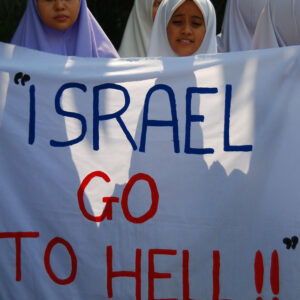Several Jewish residents of New Hampshire were surprised to see last week that, along with Wednesday night’s celebration of Hanukkah, the City of Concord’s official calendar includes another observance every May.
Nakba Day, declaring the creation of Israel a “catastrophe” and calling for its destruction.
It’s a jarring juxtaposition. Hanukkah celebrates the survival of Jewish faith in the city of Jerusalem some 2,200 years ago, when Jews drove their oppressors from their holy city and reclaimed their temple.
Nakba Day declares the return of a Jewish state to (parts of) Jerusalem and historic Israel a “catastrophe,” and is a day that often features antisemitic messages and calls for destruction of the nation of Israel.
According to the City of Concord’s “Diversity & Inclusion Calendar” for 2024, “This observance marks the Nakba, or Catastrophe, during which Zionist forces in 1948 expelled hundreds of thousands of Palestinian people from their homelands. During the expulsion, hundreds of villages were attacked and destroyed and 15,000 Palestinians were killed.”

That account of the founding of Israel is rejected by many historians, who note that some 700,000 Arabs living within the borders of the newly-formed nation dispersed to the Jordanian-occupied West Bank, the Egyptian-occupied Gaza Strip, and neighboring Arab countries. They expected the five invading Arab armies from the nations that declared war on Israel would defeat the new state and they would return.
The “catastrophe”‘ is that Israel survived.
“Every year on May 15, Palestinians and their supporters, including many anti-Israel activists, mark Nakba Day (“catastrophe” in Arabic) as a day of mourning the creation of the State of Israel on May 14, 1948,” according to the Anti-Defamation League. “Historically, there have been numerous instances of inflammatory and antisemitic language espoused by anti-Israel activists at Nakba Day events.
When the United Nations, an organization known for its anti-Israel ideology, chose to commemorate the “Nakba” last year, the U.S., the U.K., and Canada all voted against it.
“Attending this despicable event means destroying any chance of peace by adopting the Palestinian narrative calling the establishment of the state of Israel a disaster,” Israeli’s U.N. ambassador Gilad Erdan said at the time.
And while Nakba Day events are uncommon in Concord, the city government features it on its “Diversity & Inclusion Calendar” for 2024. When the commemoration was spotted on the calendar by a concerned citizen in the Jewish community, it was brought to the attention of Jewish leaders in the state who were anxious to discuss it further with the city.
The fact that such a controversial — and anti-Israel — event as Nakba Day would be placed on the calendar without input from the Jewish community is surprising, several Granite State Jewish residents told NHJournal on the background.
Asked on Monday if she was aware of the city’s actions, Rabbi Robin Nafshi of Temple Beth Jacob said, “I had no idea, so no, no one reached out to me before or after this was done.”
“I do not support the idea unless the City wants to be balanced and also acknowledge Yom Ha-atzma-ut, Israel Independence Day, counter observance to Nakba,” the rabbi added.
NHJournal has been trying to get a comment from Mayor Byron Champlin on the issue since last week. Every member of Nashua City Council has been contacted, too.
All have declined to respond.
However, soon after NHJournal contacted city officials, the city posted its 2025 “Diversity & Inclusion” calendar, and the description of Nakba Day is very different:
“Annual day of commemoration for Palestinians.”
![]()
Rep. James Spillane (R-Deerfield) is co-chair of the bipartisan NH-Israel Relations Caucus.
“The City of Concord’s decision to recognize Nakba Day, a controversial and polarizing event often associated with anti-Israel rhetoric, is deeply troubling,” Spillane said Monday. “This action risks normalizing antisemitism and alienating members of the Jewish community. Recognizing Nakba Day on an official city calendar is not an act of inclusion—it is a disregard for the pain and marginalization felt by Jewish residents. Concord must do better.”





